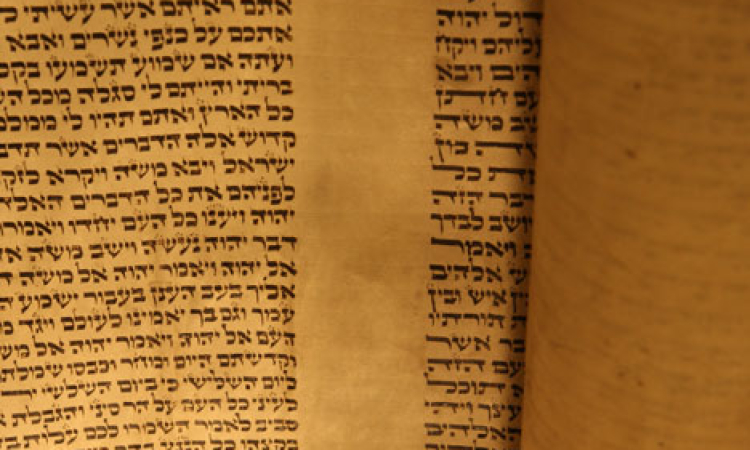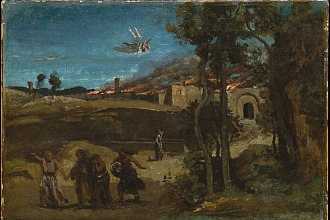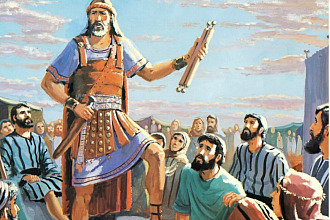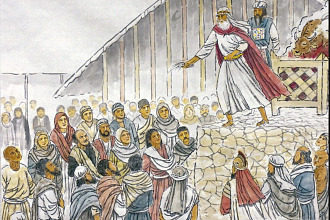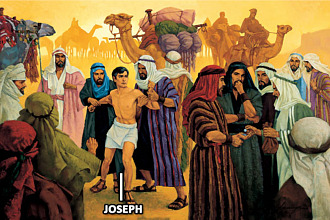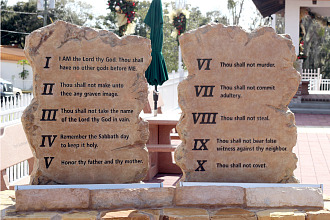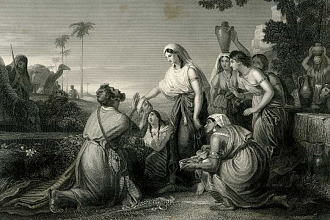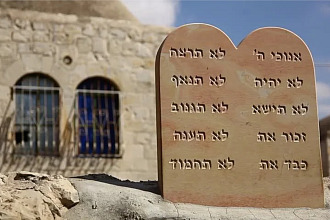Parasha for the Week: Shemot: Exodus 1:1 – 6:1
Haftarah: Isaiah 27:6 – 29:23 (Ashkenazim
Haftarah: Jeremiah 1:1 – 2:3 – (Sephardim)
Apostolic Writings: Mark 14:10 - 21
Overview:
The Book of Shemot (Exodus) chronicles the creation of the nation of Israel from the descendants of Yaakov.
At the beginning of this week’s Parasha, Pharaoh, fearing the population explosion of Israel, enslaves them.
However, when their birthrate increases, he orders Israel’s midwives to kill all newborn males.
Yocheved gives birth to Moshe and hides him in the reeds by the Nile. Pharaoh’s daughter finds and adopts him, although she knows he is probably a Hebrew. Miriam, Moshe’s sister, offers to find a nursemaid for Moshe and arranges for his mother Yocheved to fulfill that role.
Years later, Moshe witnesses an Egyptian beating a Hebrew and Moshe kills the Egyptian.Realizing his life is in danger, Moshe flees to Midian where he rescues Tzipporah, whose father Yitro (Reuel) approves their subsequent marriage.
On Chorev (Mt. Sinai) Moshe witnesses the burning bush where G-d commands him to lead the People of Israel from Egypt to Eretz Yisrael, the land promised to their ancestors.
Moshe protests that the People of Israel will doubt his being G-d’s agent, so G-d enables Moshe to perform three miraculous transformations to validate himself in the people’s eyes: transforming his staff into a snake, his healthy hand into a leprous one, and water into blood.
When Moshe declares that he is not a good public speaker G-d tells him that his brother Aharon will be his spokesman.
Aharon greets Moshe on his return to Egypt and they petition Pharaoh to release Israel.
Pharaoh responds with even harsher decrees, declaring that Israel must produce the same quota of bricks as before but without being given supplies.
The people become dispirited, but G-d assures Moshe that He will force Pharaoh to let the Israel leave.
"A New Pharaoh"
The Torah states at the beginning of Shemot “Now there arose a new king over Egypt, who did not know Joseph” (Exodus 1:8). How a Pharaoh could ignore one of the last governors of Egypt, assistant of Pharaoh. Let's investigate Egyptian history.
We learn from Egyptian history that there was a long period (1730-1580 BC) when no Egyptian tribes ruled Egypt. The rulers of this period were the Hyksos. They were certainly the rulers of Egypt when Joseph and Jacob entered the country and were installed in the land of Goshen. The Hyksos were considered as a Semitic tribe, that is why it was not difficult for them to appoint Joseph who was also a Semite as the Governor or the Prime Minister. In this context we understand what happens during the great famine of Egypt at the end of the book of Genesis “So Joseph bought all the land of Egypt for Pharaoh, for all the Egyptians sold their fields, because the famine was severe on them. The land became Pharaoh’s. As for the people, he made servants of them from one end of Egypt to the other.” (Genesis 47:20–21). The Egyptians were becoming slaves in their own country, Joseph was an instrument for that, even though he was just obeying Pharaoh, the Egyptians started to hate Joseph and his people. It is clear that later, when the Egyptians came back to power, they wanted to take revenge against this Semitic Hebrews who reduced them to slavery and were willing to see the Hebrews to become slaves also.
In 1580 BC., the Hyksos were defeated by the rulers of the 18th dynasty from Thebes and of course the new Pharaoh did not know Joseph or did not want to know Joseph because he was an instrument in the hand of the Hyksos who were the occupier. If the date of 1580 BC. is correct, and the Hebrew were in disgrace at that time they were in slavery for about 130 years since many scholars believe that the Exodus took place around 1450 BC. This goes with the Genealogy of Moses, since we learn from the Torah that there were only five generations between Jacob and Moses. Jacob was the father of Levi, who was the father of Kohath, who was the father of Amram and who was the father of Aaron, Myriam and Moses.
"The People B’nei Yisrael"
The Torah continues “He said to his people, 'Look, the people of Bnei-Yisrael are too numerous and too powerful for us'.” (Exodus 1:9). The Hebrew text says "‘Am Bnei Yisrael", they are not anymore a single family, they became a “people” it is the translation of the word ‘Am, they are the “people of the children of Israel” they have kept the name of their ancestor Yaakov who was named Yisrael by G-d, they are not anymore the Hebrews but Yisrael.
The next Hebrew expression Rav Ve’atsum Miménu cannot mean “more numerous and stronger than us [the Egyptian].” The Egyptians were undoubtedly more powerful and more numerous than the Jews living in Goshen. Rabbi Hirsch suggests that we have to understand this sentence in the same sense that Abimelech used the word Miménu (than us) when he was speaking with Isaac “Go away from us, for you are much mightier than we.” (Genesis 26:16), which can only mean: “For us, you are much too strong, we cannot stand idly by while you, one individual become so powerful, more powerful than any other individual in our midst.” The population of Egypt was divided into castes it consisted of various ‘amim. So in a similar vein, the king of Egypt could say “Look at the people of Israel, united as one soul, one heart. They have become too powerful. There is not one caste among us that can compare with them in number or in abundance of dynamic power at its disposal.”
The first anti-Semitic law was not taken because the people of Israel had done something wrong. Pharaoh was not able to charge them with any wrongdoing. This new anti-Semitic laws came from above, it was a political move, from a tyrannical regime, in order to submit this group of people who was so close of the old rulers.
Similar considerations may have motivated the instigator of these, the very first Anti-Jewish laws. The Pharaoh wished to compensate the Egyptian people for his despotic rule. For this purpose he created a pariah caste, upon which all the other castes could look down with contempt and thus self-assured, imagine themselves to be free men.
Rabbi Hirsch adds “The fact that Pharaoh found nothing with which to blame Israel except for their high birth rate, and that to justify the harsh measures that he intended to enact, he had to cite reasons of “national interest” is brilliant testimony to Israel’ s social and moral decency.”
"Taskmasters"
The text says: “Therefore they set taskmasters over them to afflict them with heavy burdens. They built for Pharaoh store cities, Pithom and Raamses.” (Exodus 1:11), We put “taskmasters” in italic because the translation could be better. The Hebrew words Sarei Missim, should be translated as "taxes officers" Sarei means "princes" or "officers" and Missim is the Hebrew word for taxes, today Mass Hachnassa is the taxes incomes, thus we can understand that until that day the Israelites were exempted from taxation. The next expression “to afflict them with heavy burdens” they received heavy taxes to compensate what they did not pay before. Rabbi Hirsch says that this expression is not a burden imposed upon the bearer for the sole purpose of oppressing him, but, rather, a burden to be carried and looked after. In the verse twelve we discover that the labor-tax did not achieve its objective. “But the more they afflicted them, the more they multiplied and the more they spread.” (Exodus 1:12). God's Blessings upon Israel continues.
HAFTARAH: Isaiah 27:6 – 29:23 – Ashkenazim
In the haftarah the stress is put first on the punishment of Israel, but a limited punishment, which is not a total destruction but an exile: “You contended with her by banishing her, by driving her away.” (Isaiah 27:8) Then, will come the blessings upon Yaakov who is removed from Egypt and will be fully blessed by the L-rd, and we have to understand that this blessings will come from the Lord, since in the verse 12 and 13 the following sentence is repeated twice: “It will come about in that day,” to do what? “Hashem will thresh from the channel of the River to the Wadi of Egypt, and you will be gathered one by one, Bnei-Yisrael.” (Isaiah 27:12). The promise of gathering the children of Israel is given, more than that, the true worship will be back in Jerusalem. “a great shofar will be blown. Those perishing in the land of Assyria and the exiles in the land of Egypt will come and worship Hashem on the holy mountain in Jerusalem.” (Isaiah 27:13).
The last chapter of this haftarah, is about an enigmatic Ariel, “Oy, Ariel, Ariel! City where David camped. Year to year again—festivals in a cycle.” (Isaiah 29:1), this city is named five times in the text (1 twice, 2 twice and 7). Ariel is in fact a new name for Jerusalem, the city of David, and more explicitly the Mont Zion, which is mentioned later, “with the multitude of all the nations warring against Mount Zion.” (Isaiah 29:8). The text ends again with the blessings of G-d, “Therefore, thus says Hashem, Redeemer of Abraham, concerning the house of Jacob: “Jacob will no longer be ashamed, no longer will his face grow pale; for when he sees his children, the work of My hands in his midst, they will sanctify My Name; they will sanctify the Holy One of Jacob, and stand in awe of the God of Israel.” (Isaiah 29:22–23), even though Israel cannot avoid punishment for her sins, she is still God’s people and God is still her God.
HAFTARAH: Jeremiah 1:1 – 2:3 – Sephardim
The Sephardic people read in parallel with the parasha Shemot the Haftarah of Jeremiah. As Moses received his call in Parashah Shemot, Jeremiah receives his calling in the chapter one of his book. Moshe did not want to be a prophet of God and tried to refuse, Jeremiah as well did not want to be a prophet of God, Jeremiah used the same argument as Moses: “I do not know how to speak” (Jeremiah 1:6). G-d said: “Do not be afraid of them! For I am with you to deliver you.” (Jeremiah 1:8). Why Jeremiah would be “afraid?” The answer is in the verse 1, where it is said that Jeremiah was one of the prophet of Anathoth. Anathoth is a city with a special privilege, it was one of the city given to the first born among the priests, the descendants of Aaron (Josh. 21:17–19). But the family of the priests who were living in Anathoth had a sad history. This history can go back first to the time of Solomon, when the high priest was Abiathar. However, Abiathar was not faithful to the new king as he was with King David, and because of that he received two punishment: first not to live anymore in Jerusalem, “Go to Anathoth, to your own fields, for you deserve death, but I will not put you to death at this time, because you carried the ark of Hashem Elohim before my father David,” (1 Kings 2:26). He was exiled in the city of his ancestors, and secondly was dismiss from his function as a High Priest: “So Solomon dismissed Abiathar from being kohen to Hashem (1 Kings 2:27a). As descendant of the family of Abiathar, Jeremiah was member of a curse family. He knew that, coming from Anathoth, he would not be accepted, neither as a priest or as a prophet.
APOSTOLIC WRITINGS: Mark 14:10 - 21
We continue our reading of the Besorah of Mark in connection with the parasha. This week we start reading the book of Exodus which relates the slavery of Israel in Egypt and the Exodus from Egypt. The first chapter of Exodus mentions Pharaoh’s betrayal. We remember that the people of Israel came to Egypt to join Joseph who was living there and who saved the Egyptians from a severe famine. Pharaoh was grateful for what Joseph did for his country. However, after the death of Joseph and Pharaoh, a new Pharaoh came on the throne “who did not know Joseph.” (Exodus 1:8). This statement is surprising, because the Egyptians had a very good way to remember what happened in their history. Thus, Pharaoh’s attitude can be perceived as a betrayal, which is in parallel with another betrayal at the beginning of the Besorah of Mark: “Then Judas Iscariot, who was one of the twelve, went to the chief priests in order to betray him to them” (Mark 14:10). Judas was one of the disciples of Yeshua, he followed Yeshua during his three years of ministry, attended his teaching, and his miracles, witnessed his love and compassion for people. But Yeshua did not meet his expectations and decided to betray him.
Then the narration shifts to another scene: it is the time of Pesach (Passover), “And on the first day of Unleavened Bread, when they sacrificed the Pesach lamb, his disciples said to him, ‘Where will you have us go and prepare for you to eat the Pesach?’” (Mark 14:12). A beautiful parallel with the parasha and the book of Exodus, because the narration of the first twelve chapters of Exodus is the story of Pesach, which will be the foundation of the Haggadah recited during the Seder, on the first night of Pesach. There is an allusion to the concept of a feast in the chapter 5 of the Exodus. “Afterward Moses and Aaron went to Pharaoh and said, “Thus, says the L-RD, the G-d of Israel, ‘Let my people go, so that they may celebrate a festival to me in the wilderness.” (Exodus 5:1). It is clear that this feast Moses wants the people of Israel to celebrate is not the Pesach, because Pesach will be ordained by God, later, after 9 plagues as the people of Israel will leave Egypt in a hurry after the death of the Egyptian firstborns. The feast of the fifth chapter of Exodus is in fact the Shabbat. God has given the Shabbat to humanity from the time of the creation of the world (Genesis 2:1-3), this special day was given to Noah, Abraham, Isaac, Jacob and the people of Israel, but being slaves in Egypt for the last two centuries, it was impossible for Israel to keep and remember the Shabbat day. G-d wants to link again his people with the creation and the day of worship (Exodus 16).
Here too there is a parallel with the story of Yeshua and Pesach, the Besorah says that it was the day of the sacrifice of the lamb, that means they were just before Pesach, The morrow will be the first day of Pesach, a Shabbat day, indeed, according to the Bible the first day of Pesach had to be considered as a day of Shabbat, that means a day of rest: “On the first day you shall have a holy convocation; you shall not do any ordinary work.” (Leviticus 23:7). However, the Besorah does not say that Yeshua and his disciples celebrated the Pesach immediately, as every Jewish family they had to prepare it. “And he sent two of his disciples and said to them, ‘Go into the city, and a man carrying a jar of water will meet you. Follow him, and wherever he enters, say to the master of the house, ‘The Teacher says, where is my guest room, where I may eat the Pesach with my disciples?’ And he will show you a large upper room furnished and ready; there prepare for us.’ And the disciples set out and went to the city and found it just as he had told them, and they prepared the Pesach.” (Mark 14:13–16). This preparation is in parallel with the text of the parasha, which is a preparation of the first Pesach of Israel, in fact it will take three parashot to prepare the first Pesach. But the Besorah is shorter than the Torah, that is why just after the preparation, Yeshua celebrates this special Seder with the disciples: “And when it was evening, he came with the twelve.” (Mark 14:17) After Yeshua announced what would happen, the text says that “They began to be sorrowful” even though Pesach is a joyful feast which celebrate the freedom of Israel, in the parasha, it is not yet time of joy, the people of Israel are still in slavery. Even though Moses, being in the territory of Median, received his call to go back to Egypt and to speak to Pharaoh, the people are not yet free, Moses announced it. In the same way this text of Mark is announcing the great joy of the world who would be saved from slavery of sin. In the parasha the savior was symbolized by the Pesach lamb and this Besorah of Mark starts to tell us that Mashiach is the Pesach lamb who will die for the world. It is difficult to understand this truth, but in fact from the very beginning when G-d made clothes to Adam and Eve, explained to the our first parents that salvation should come from the death of a substitute. This was taught to Cain and Abel, to Noah, to Abraham, to Yitschak, to Yaakov and to the people of Israel through the service in the sanctuary, and later in the temple. Why all these sacrifices, not to satisfy a god thirsty of blood, but to teach Israel about the coming of the Messiah who will suffer and die for his people as it is written in the Biblical prophecies: “He was despised and rejected by men, a man of sorrows, acquainted with grief, one from whom people hide their faces. He was despised, and we did not esteem Him. Surely, He has borne our griefs and carried our pains. Yet we esteemed Him stricken, struck by God, and afflicted. But He was pierced because of our transgressions, crushed because of our iniquities. The chastisement for our shalom was upon Him, and by His stripes we are healed.” (Isaiah 53:3–5). What a great love, giving his life for each one of us, that is the incredible love of G-d for us.

